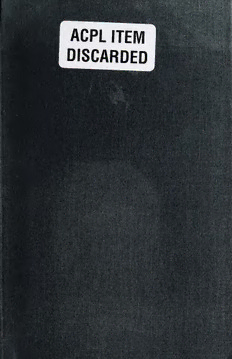
Taxation in Egypt from Augustus to Diocletian, by Sherman Le Roy Wallace, ... PDF
Preview Taxation in Egypt from Augustus to Diocletian, by Sherman Le Roy Wallace, ...
336.2 • * W15t Wallace 1113485 Taxation in Egypt from Augustus to Diocletian 00 % T E K C O R M O R F S D R A PUBLIC LIBRARY C FORT WAYNE AND ALLEN COUNTY, IND. yT\ * STO ACPL ITEM DISCARDED PRINCETON UNIVERSITY STUDIES IN PAPYROLOGY No. 2 Edited by allan Chester Johnson TAXATION IN EGYPT FROM AUGUSTUS TO DIOCLETIAN OXFORD UNIVERSITY PRESS AMEN HOUSE, E.C. \ London Edinburgh Glasgow New York Toronto Melbourne Capetown Bombay Calcutta Madras HUMPHREY MILFORD PUBLISHER TO THE UNIVERSITY PRINTED IN GREAT BRITAIN THE MEMORY OF MY FATHER 1113485 Digitized by the Internet Archive in 2018 https://archive.org/details/taxationinegyptfOOwall PREFACE I N this volume I have attempted to give a detailed and com¬ prehensive discussion of the system of taxation in Egypt from the beginning of the principate of Augustus until the accession of Diocletian. In 1899 Wilcken published Volume I of his Griechische Ostraka aus Aegypten und Nubien, which contained a detailed discussion of the evidence then available concerning taxation in Graeco-Roman Egypt. When the work for the present volume was begun in 1931 there had been no compre¬ hensive treatment published since Wilcken’s, although very many new documents referring to taxation, particularly in Lower Egypt, had been made available within that interval. It therefore seemed a service to papyrologists and to students of economic history to reduce the new and old evidence to order, and the results of five years of study are here presented. I wish to express my sincere thanks to the Rockefeller Foundation which, through the Council on the Humanities of Princeton University, gave generous financial assistance that enabled me to devote an entire year to uninterrupted preparation of this volume, and which contributed generously towards the publica¬ tion of it. After the preparation was begun, however, the publication , by Kiessling of the third volume of Preisigke’s Worterbuch including alphabetic lists of taxes and collectors together with references to the sources, and the appearance of the article TeXrj by Schwann in Volume A 9 of Pauly-Wissowa’s Real- encyklopaedie made easier the access to evidence bearing on the system of taxation in Egypt. Nevertheless, it is hoped that the present study is more complete than any hitherto available, and that a fresh consideration of the evidence has made progress towards the solution of some of the problems involved. In spite of the great increase in the number of published tax- documents, many points in the system of taxation remain ob¬ scure. Consequently there will be found a certain unevenness in the following chapters, for I have sometimes been compelled to abandon the systematic treatment of taxation and resort to alphabetic lists of taxes such as are familiar in earlier works. PREFACE Vlll Our evidence is largely confined to a few districts in Egypt and, since the system of taxation is not uniform, it is more than pro¬ bable that further publications of papyri may sweep away some of the conclusions now offered as easily as new evidence has disproved solutions presented by earlier students. This study I have endeavoured to make as complete as the present state of the documentary evidence allows. Experience has indicated, however, that it is practically impossible to con¬ trol every published document, in spite of the excellence of the Princeton University Library’s collection of published papyri where the material for this volume was collected. An effort has been made to make the text of this volume intelligible to stu¬ dents of economic history who are not familiar with Greek, but the attempt has not been wholly successful and was abandoned in Chapter XVII, where the variety of collectors and of their activities could not be represented by translations of their titles or of the taxes which they collected. The index is in Greek, but there is also a brief index of English and Latin terms for which there is no Greek equivalent in this volume. I have not included a systematic bibliography. Most of the significant studies of taxation since Wilcken’s Ostraka have appeared in connexion with the publication of tax-documents, and references to these and to other discussions will be found in the notes on the vari¬ ous taxes. It seems unnecessary to repeat the select biblio¬ graphies which may be found in Volume X of the Cambridge Ancient History and in A. C. Johnson’s Roman Egypt. The abbreviations used in this volume to indicate collections of papyri have been taken for the most part from Preisigke’s Worterbuch and his Berichtigungsliste. I wish to express my obligation to the authorities of Prince¬ ton University Library and of the Library of the University of Wisconsin for assistance in assembling reference material. I feel a special debt of gratitude to Mr. H. I. Bell and Mr. T. C. Skeat for furnishing transcriptions of unpublished tax-docu¬ ments in the British Museum, to Mr. H. C. Youtie for supply¬ ing excerpts from the then unpublished tax-rolls from Caranis at the University of Michigan Library, to Dr. Edmund H. Kase Jr. for permission to use his transcriptions of tax-documents in the Princeton University Library, and to Professor A. G. Laird
